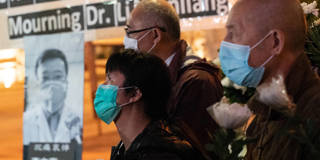The COVID-19 outbreak in China is not the first public-health emergency enabled by the absence of freedom of speech in China, and it is far from the worst. Between 1958 and 1962, the inability to criticize bad policy led to a famine that killed an estimated 36 million Chinese.
NEW YORK – Before the world had any knowledge of the new coronavirus that has sparked a global panic a Wuhan-based ophthalmologist, Li Wenliang, noticed something strange in a few patients. They seemed to have contracted an unfamiliar virus that resembled severe acute respiratory syndrome (SARS), which hobbled China nearly a generation ago. A few days later, after Li had sent a warning message to several doctors in a group chat, the 34-year-old doctor was summoned by the police, who forced him to sign a letter confessing to “making false comments” that had “disrupted the social order.” Li is now dead, a victim of the very virus – now called COVID-19 – about which he sounded the alarm.

NEW YORK – Before the world had any knowledge of the new coronavirus that has sparked a global panic a Wuhan-based ophthalmologist, Li Wenliang, noticed something strange in a few patients. They seemed to have contracted an unfamiliar virus that resembled severe acute respiratory syndrome (SARS), which hobbled China nearly a generation ago. A few days later, after Li had sent a warning message to several doctors in a group chat, the 34-year-old doctor was summoned by the police, who forced him to sign a letter confessing to “making false comments” that had “disrupted the social order.” Li is now dead, a victim of the very virus – now called COVID-19 – about which he sounded the alarm.